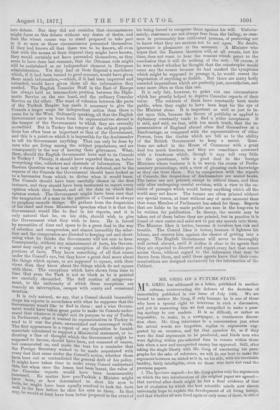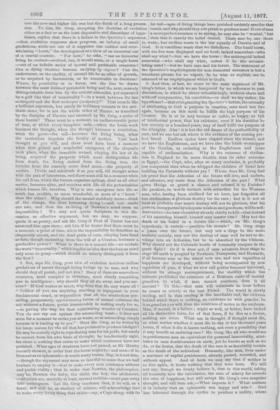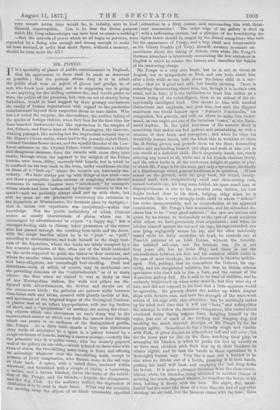MR. GREG ON A FUTURE STATE.
MR. GREG has addressed us a letter, published in another column, controverting the defence of the doctrine of immortality published in our issue of July 14th. We are bound to answer Mr. Grog, if only because he is one of those who have a special right to intervene in such a discussion, and yet in answering him we feel compelled to make a pass- ing apology to our readers. It is so difficult, or rather so impossible, to make, in a newspaper, a continuous discus- sion clear. Mr. Greg intervenes in a conversation just when the actual words are forgotten, replies to arguments sug- gested by an occasion, and for that occasion fit, as if they were the final arguments to be produced, and binds men who were fighting within pre-selected lists to remain within those lists when a new and unexpected enemy has appeared. Still, after taking the single liberty with Mr. Greg of numbering his para- graphs for the sake of reference, we will do our best to make the argument between us, stated as it is, on his side, with his inevitable lucidity, fairly intelligible, even to those who have not read the previous papers. 1. The Spectator argued—for Mr. Greg quotes only the arguments on which the two interlocutors of the original paper are agreed.— that survival after death might be but a final evidence of that law of evolution by which the best scientific minds now almost universally hope to explain the development of all living beings, and that whether all men lived again or only some of them, in either case the new and higher life was but the finish of a long proces- sion. To this, Mr. Greg, accepting the doctrine of evolution either as a fact or as the least disputable and discordant of hypo- themes, replies that there is a failure in the Spectator's argument, —that evolution supposes slow progress, an infinity of small gradations, while our use of it supposes one sudden and over- whelming "burst," the development at a blow of an immortal out of a mortal creature. "For how," he asks, "can an immortal being be etiokedevolved, too, it would seem, at a single burst —out of an infinite series of mortal and perishable creatures ? Can a dying creature become undying /oy degrees? Can the endowment, or the quality, of eternal life be an affair of growth, or be acquired by increments, or be conceivable in fractions? Where, by possibility or in fancy, can the line be drawn between the most finished perishable being and the next, scarcely distinguishable from him by the acutest naturalist, yet separated by a gulf like that of immortality ?—in a word, between the last anthropoid and the first anthropos (are)?" That sounds like a 'brilliant argument, but surely its brilliancy consists in the anti- thesis alone, for is not the whole order of Nature, as described by the disciples of Darwin and assumed by Mr. Greg, a series of these bursts? There must be a moment, an undiscoverable point of time, at which every inception ends,—when the brain-work becomes the thought, when the thought becomes a conviction, when the germ—the cell—becomes the living being, when the motionless acquires the faculty of motion. Cast back thought as you will, and there must have been a moment when that primal and wonderful emergence of the chrysalis took place, when the immobile monad, obeying the law of its being, acquired the property which most distinguishes life from death, the living animal from the living tree, the tortoise from the scarcely more dead stone,—the property of motion. Divide and subdivide it as you will, till thought aches with the pain of intentness, and there must still be a moment when the cell from which the human organism springs, dead as all other matter, becomes alive, and receives with life all the potentialities which human life involves. Why is one emergence into life so much leas credible, or more wonderful, or more of a " burst" than the other ? Why should the monad suddenly move—think of the change, the dead becoming living i—and not excite our awe, and then the re-living of NeWton's mind seem an impossibility ? We may not quote Scripture in this dis- cussion as effective argument, but we may, we suppose, quote it as poetry, and ask Mr. Greg if Paul of Tarsus has not answered him ages since ; ask him if be denies that there must be a moment, a point of time, when the impossibility he describes so eloquently occurs, and the dead grain of corn, obeying laws fixed as fate, though emanating from the will of a Creator, becomes a productive power ? What is there in a second life—we exclude the word "immortality," which implies an idea that the human mind only seems to grasp—which should so utterly distinguish it from the first ?
2. But, says Mr. Greg, your idea of evolution involves endless gradations of ascent through living beings up to man, and why should they all perish, and not you ? Many of them are marvellous creatures, most complex in structure, most closely resembling you in intelligence ; why should they all die away, and you sur- vive? If God wastes so much, why deny that He may waste all ? " Neither of you see anything startling or repugnant in your fundamental creed, or supposition that all the numberless pre- ceding, preparatory, approximating forms of animal existence die out without a future, perish irretrievably in making ready for us, —in paving the way for that culminating wonder of Creation.
;
You do not erg out against this astounding waste it does not seem for a moment to strike you as waste, or as astounding, simply because it ia leading up to you." Does Mr. Greg, as he writes by his lamp, mourn for the oil that has perished to produce his light ? He may be morally right in reprobating man for his pride, but surely he cannot, from his own basis of thought, be intellectually right, for there is nothing that exists to make which existences have not perished. What ages of creatures have not passed, as Mr. Huxley recently showed, in order that the horse might be and man—if he lives not as an ephemeris—is worth many horses. Nay, is it not true, —though the argument may seem so fanciful to sonic that we half hesitate to employ it—that to make every man existences without end perish visibly ; that in order that Newton, the philosopher, may he Newton the baby, the child, the boy, the adolescent, —all which are, mentally at least, several entities—must pass away into nothingness. Let Mr. Greg condemn that, if he will, as fancy, and still he, as student of science, will acknowledge that to make every living thing that exists—say, a Cape sheep, with its
fat tail—ages of living timings have perished uselessly save for that result, and why shouldthey not perish to produce man? If out of man produce a nullity, whoso
a more perfect creature is to spring, he may also be " wasted," but then that is exactly the belief denied. There may basnav. there is, waste, but endless waste is the law equally of Darwin and of God. It is resultless waste that we disbelieve. The fossil horse, with his five toes displayed and no hoof, lacked somewhat—who shall say what?—but we have the horse ; the anthropoid lathed somewhatwho shall say what, unless it be the aceumu- lating mind ?—but we have man and his future. The statement of the Spectator's unpityingness for non-immortal ancestors is but a trenchant plira'se, for no arguer, be he wise or sophist, can be ashamed of an unpityinguess which is God's.
3. And then, at last, we come to the main argument of Mr. Greg's letter, in which we are hampered by no reference to past discuilaions, in which he states unhesitatingly, withdut alarm and without compunction, his conviction—or shall we say rather, his hypothesis ?—that even granting the Spectator's datum, the necessity of attributing to God a purpose in creation, man need not live again, because on this earth he fulfils the high purpose of his Creator. He is or he may become so noble, so happy, so full of intellectual power, that his existence, even if his duration be but seventy or a hundred years, may of itself fulfil the purpose of the Almighty. Alas Lit is but the old dream of the perfectibility of man, and we can but ask where is the evidence of the coming per- fect breed. Endless cycles have elapsed since the monad, and we have the Englishman, and we have also the fetish-worshipper of the Gambia, as enduring as the Englishman and more capable of acclimatisation. Why is the outcome of civiliza- tion in England to be more durable than its older outcome in Egypt,—the Copt, who, after so many centuries, is probably less competent than when he whipped the children of Israel into building the Pyramids without pay ? Where does Mr. Greg find his proof that the Athenian of the future will live, and endure, and advance, any more than the Athenian of the past? What gives Hodge so grand a chance and refused it to Pericles ? He predicts, in words instinct with attraction for the Western man, who, having been civilised for an hour, has forgotten all but civilisation, a glorious destiny for the race ; but is it not at least as probable that man's destiny will not be glorious, that his powers, unsupported by adequate wisdom and goodness, willbe self - destructive—he uses chemistry already chiefly to kill—that instead of his mastering himself, himself may master him ? May not the death of his belief in a future life — which, On Mr. Greg's hypothesis, is certain —paralyse his morale ? Mr. Greg sings a paean over the future, but may not a dirge be the more truthful melody, may not the destiny of man well be not to de- velope into an Athenian, but to be absorbed by the Chinese. Why should not the Colorado beetle of humanity conquer in the great fight ? Or if it does not, if man advancea from stage to stage till earth is peopled by Newtons, Tennysons, and Howard, if all become wise as the wisest now are, and new capacities of happiness are developed, without being accompanied by new capacities of pain, if what we now call genius becomes universal, without its strange accompaniment, the sterility which has hitherto prohibited the existence of a Brahmin caste of mental
grandees, to what, if man cannot continue, does it all amount ? To this,—that man will culminate an hour before he ceases as utterly as the lost Pleiaci. The world is slowly
cooling, and in that cooling is the inevitable enri, the oblivion behind which there is nothing, an existence no whit grander, be it as grand as you will, than the existence of motes in the sunbeam. Man, if mortal, is a failure ; might Ws well, or better, have lacked all his distinctive force, for of that force, if he dies its a flower, nothing can come. What use in thought, if thought must
or what matter whether it must die to-day or ten thousand years hence, if when it die it leaves nothing, not even a possibility that it may benefit an enduring race ? Mr. Greg, like all who would see in posthumous man an equivalent for personal immortality, attri- butea to man deathlessness on earth, yet he knows as well as we do, or far better, that the death of the race is as inevitably certain as the death of the individual. Humanity, like man, lives under a sentence of capital punishment, already passed, recorded, and without appeal. And of both we may say that if neither is to live again, it boots nothing that they were born. We will not say, though we firmly believe it, that in this world, taking all humanity into the calculation, the sum of misery far exceeds the sum of happiness, but will accept Mr. Greg's own sanguine' thought, and will then ask,—What imports it ? What matters it in infinity that an ephemeris was happy and wise ? God has laboured through the .cycles to
should be once more the All ? monitions about the taking of tickets, even while Mr. Pongo's
































 Previous page
Previous page